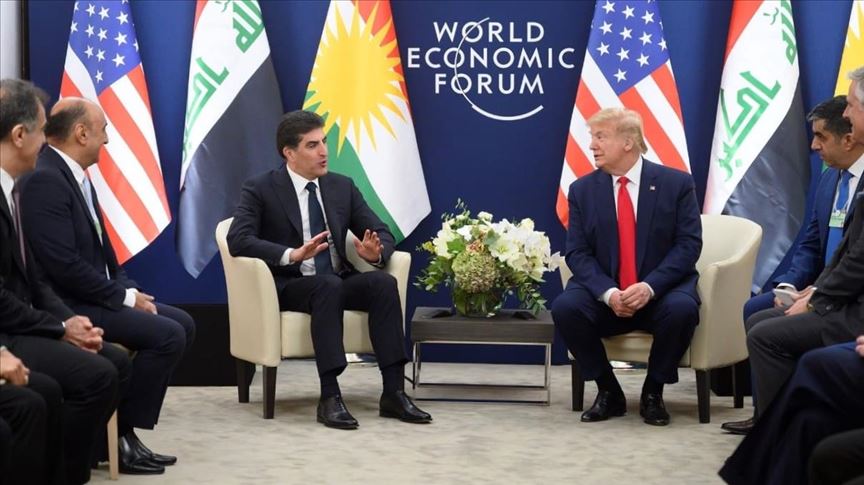Trump meets KRG leader, Iraqi president in Davos
Separate meetings take place on sidelines of World Economic Forum
 U.S. President Donald Trump (R) meets Iraq's Kurdish Regional Government (IKRG) President Nechirvan Barzani (L) on the sidelines of the World Economic Forum 50th Annual Meeting in Davos, Switzerland on January 22, 2020. ( Iraqi Kurdish Regional Government / Handout - Anadolu Agency )
U.S. President Donald Trump (R) meets Iraq's Kurdish Regional Government (IKRG) President Nechirvan Barzani (L) on the sidelines of the World Economic Forum 50th Annual Meeting in Davos, Switzerland on January 22, 2020. ( Iraqi Kurdish Regional Government / Handout - Anadolu Agency )
WASHINGTON
U.S. President Donald Trump on Wednesday met with Iraq's Kurdish Regional Government's leader Nechirvan Barzani and his Iraqi counterpart, Barhem Saleh, in Switzerland.
Trump's separate meetings took place on the sidelines of World Economic Forum in Davos.
Barzani used the gathering to thank the U.S. leader, saying "we've been, quite a long time, waiting for that moment."
He said Washington and Erbil worked together to defeat the Daesh/ISIS terror group. Trump responded "right".
While hosting the Iraqi president, Trump highlighted cooperation between the two countries on military and anti-Daesh efforts.
Saleh echoed the U.S. president, saying both countries "had an enduring relationship"
"The United States has been a partner to Iraq and in the war against ISIS. This mission needs to be accomplished," said Saleh.
On a question if Washington will withdraw troops from Iraq, Trump said the U.S. and Iraq are talking about "a lot of different things and you’ll be hearing whatever we do."
He said the U.S. had 5,000 troops and called it "a very low number".
"So we’re down to a very low number, historically low. And we’ll see what happens," Trump added.
Earlier this month, Qasem Soleimani, the head of Iran's Islamic Revolutionary Guards Corps' (IRGC) elite Quds Force, was killed in a U.S. drone strike in Baghdad.
His death marked a dramatic escalation in tensions between the U.S. and Iran, which have often been at a fever pitch since Trump chose in 2018 to unilaterally withdraw Washington from a 2015 nuclear pact world powers struck with Tehran.
Iran's Supreme Leader Khamenei, who bestowed the country's highest honor on Soleimani last year, vowed "severe retaliation" in response to his killing.
Iran's IRGC launched more than a dozen of ballistic missiles against U.S. military and coalition forces in Iraq.
The tension risked the lives of Iraqis and Iraq's sovereignty.
Therefore, the Iraqi parliament decided Jan. 5 to end the military presence of all foreign troops in the country, including the U.S.
On Jan. 10, Iraqi Prime Minister Adel Abdul-Mahdi called U.S. Secretary of State Mike Pompeo to demand Washington send a delegation to Iraq for establishment of a mechanism to withdraw its forces from Iraq.
However, Morgan Ortagus, spokeswoman for the U.S. Department of State, said the withdrawal from Iraq is not in the U.S. agenda.
Anadolu Agency website contains only a portion of the news stories offered to subscribers in the AA News Broadcasting System (HAS), and in summarized form. Please contact us for subscription options.







